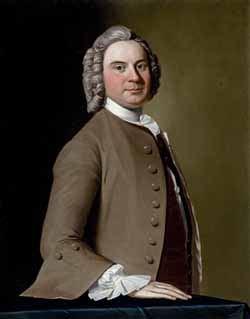Andrew Roberts’s
Spectator essay about the
Boston Tea Party,
discussed yesterday, ends with the line:
One wonders what would have happened if only Governor [Thomas] Hutchinson had put an adequate armed guard on the ships.
This facile suggestion reflects popular depictions of Boston in 1773 showing
redcoats pushing around civilians (e.g., Assassin’s Creed III, Deryn Lake’s
Death at the Boston Tea Party, &c.). So it’s worth explaining the reality Hutchinson faced.
The only British soldiers in greater Boston in late 1773 were the 64th Regiment out on Castle Island. They were too far away to quell a disturbance and too few to patrol the whole port.
Hutchinson did order that regiment’s commander, Lt. Col.
Alexander Leslie, to be ready to fire
Castle William’s guns on any ship that tried to leave the harbor without unloading and being authorized to sail.
Hutchinson could also call on, though not command, the resources of the
Royal Navy. Adm.
John Montagu stationed warships in secondary channels of Boston harbor, also preventing the
tea ships from leaving with their cargo. Thus, the governor did act rather strongly with military power.
What civilian authorities did Gov. Hutchinson have at his disposal? Not many. Inside Boston, the royal government had one arm of law enforcement: the
Customs service. That department’s administrators took the same hard line Hutchinson did, refusing to bend the rule that required ships to be unloaded within three weeks.
But then top Customs officials lay low, staying at Castle William or their country homes. Lower-level officers carried out their job of watching the ships at the wharf but put up no resistance when scores of men showed up on 16 December and started destroying the tea. There were too few of them to stand up to the united populace.
Boston had no police force yet. It had about a dozen
watchmen who walked around town at night, looking for trouble and
fires. Those men were employed by the town, not the colonial government, and therefore answered to the
selectmen rather than the governor.
Hutchinson could give orders to
Stephen Greenleaf, the appointed royal sheriff of Suffolk County. However, in Massachusetts the sheriff wasn’t an active law enforcer with armed deputies, like in western movies. His job consisted mainly of delivering writs and warrants.
On 30 November the governor actually sent Sheriff Greenleaf to the
Old South Meeting-House with a declaration that the gathering there was illegal and the people must disperse. Instead, the people there voted unanimously to go on with their meeting. And then
they had that vote published. Clearly the populace wasn’t cowed by that expression of royal authority.
Then there were the magistrates—justices of the peace and of the quorum. Royal governors appointed these men, too, and theoretically commanded their loyalty. But many had commissions for life from past governors, and they tended to act, or not act, independent of Hutchinson.
One magistrate,
Nathaniel Hatch, was in the
Clarke family warehouse when a
crowd attacked it on 3 November. Hatch tried to invoke the Riot Act. Hutchinson’s described what happened:
Mr. Hatch a gentleman of Dorchester & a Justice of peace commanded the peace & required them to disperse but they hooted at him & after a blow from one of them he was glad to retreat. It had no effect.
How did British
law expect magistrates to enforce such orders? By calling on a larger group of people to help enforce the law against the lawbreakers, either in a “hue and cry” emergency or in the form of a mobilized
militia. Obviously, this system didn’t work when most people supported the behavior in question.
In fact, there was a “guard on the ships” in the weeks leading up to the Tea Party. It was set up at the 28 November meeting of the people in Old South. Those patrols were composed of fervent volunteers; eventually Boston’s militia companies took turns supplying the men. That guard carried out the orders of the people, not the royal government. Its job was to ensure the tea wasn’t officially landed, and it succeeded.
Thus, the counterfactual that Roberts proposed is unrealistic. Under British and Massachusetts law the governor had no way to put armed guards on the tea ships strong enough to hold off an assault.
Another counterfactual that could actually have happened is:
One wonders what would have happened if only Governor Hutchinson had let the ships sail back to England with the tea.
Obviously the imperial government wouldn’t have been pleased with that outcome.
Lord North might have responded with actions similar to what he and
Parliament enacted in 1774: replacing Hutchinson with a stricter governor like Gen.
Thomas Gage, rewriting the Massachusetts constitution, even sending in troops to patrol the port—but to protect free trade (i.e., the unloading of tea ships) rather than to stop all trade.
The next question would be how that situation would have played out differently in Boston and in the other North American colonies.


.jpg)



















